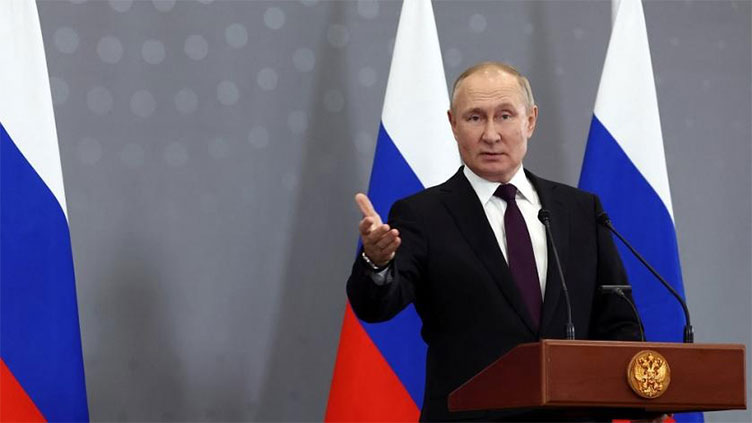Putin says draft vital to hold Ukraine front line but will end soon

World
Russia has conducted a broad mobilisation of Russians to reinforce its long front.
ASTANA (Reuters) - President Vladimir Putin said on Friday (Oct 14) that Russia s call-up of reserve forces to fight in Ukraine, criticised as chaotic by some Kremlin allies, had been vital to hold the front line but would be wound up in the next couple of weeks.
Russia has conducted a broad mobilisation of Russians to reinforce its long front after Ukraine won back territory in recent weeks. Moscow has also threatened to use nuclear weapons to defend territory including four regions of Ukraine it annexed late last month but does not fully control.
"The line of contact is 1,100km, so it is practically impossible to hold it with forces formed only of contract soldiers, especially since they take part in offensive activities," Putin told a news conference at the end of a summit in Kazakhstan, adding that those mobilised were being properly trained.
Putin said there were no plans for new massive strikes on Ukraine "for now" after what Ukraine said was the firing of 100 Russian cruise missiles this week, mainly at its electricity and heat infrastructure.
It was Russia s biggest air assault yet in an nearly 8-month conflict that has killed tens of thousands of people.
"We do not set ourselves the task of destroying Ukraine. No, of course not," Putin said, describing the war he started on Feb 24 as unpleasant but saying he had no regrets.
Putin s comments will add to speculation that Russia s supply of cruise missiles is dwindling.
Over the next two weeks, he said, Russia would wind up the mobilisation, which has been criticised by some of the Kremlin s hardline nationalist allies and led thousands of Russians to flee to neighbouring countries to avoid service.
Putin repeated the Kremlin position that Russia was willing to hold talks to end what it calls a special military operation, although he said talks would require international mediation if Ukraine was willing to take part.
Taken together, Putin s comments appeared to suggest a slight softening of his tone as the war nears the end of its eighth month, after weeks of Ukrainian advances and significant Russian defeats.
BELARUS ALERT
Ukraine launched a counteroffensive in late August against Russian forces occupying the country since the start of their invasion in February, pushing them out of a large part of the northeast and putting them under heavy pressure in the south.
Moscow s close ally Belarus ordered troops to deploy with Russian forces near Ukraine this week, prompting concern it may send its forces across the border for the first time.
On Friday President Alexander Lukashenko placed Belarus in what he called a state of heightened terrorism alert due to tension on its borders. Ukraine has denied attacking Belarus.
Kyiv s main focus now is Kherson - one of four partially occupied Ukrainian provinces that Russia claims to have annexed in recent weeks, and arguably the most strategically important.
Russia s TASS news agency said evacuees from the Kherson region were expected to begin arriving in Russia on Friday, a day after a Russian-installed official suggested people could flee to Russia, especially those around Kherson city.
While some people in Russian-occupied areas of Ukraine have fled to Russia as Ukrainian forces advance, others have reported being forced towards Russia and others still have fled westward to Ukrainian-controlled parts of their country.
STRATEGIC TARGET
A flight of civilians from Kherson would be a blow to Russia s claim last month to have annexed around 15 per cent of Ukraine s territory and incorporated an area the size of Portugal into Russia. Three quarters of UN members condemned the move as illegal on Wednesday.
Kherson city, the only major conurbation Russia has captured intact since invading in February, controls the only land route to the Crimea peninsula seized by Russia in 2014 and the mouth of the Dnipro river that bisects Ukraine.
Since the start of October, Ukrainian forces have burst through Russia s front lines in the region in their biggest advance in the south since the war began, aiming to cut Russian troops off from supply lines and escape routes across the river.
Ukraine said earlier on Friday that its armed forces had retaken 600 settlements in the past month, including 75 in the Kherson region and 43 in the eastern Donetsk region.
Reuters was not immediately able to confirm the battlefield reports.
Kherson lies next to the Zaporizhzhia region, also claimed by Russia, where Europe s biggest nuclear power plant is based.
A Russian-installed official said the plant was now working according to Russian standards. It was not clear if Ukrainian workers, who had continued operating the plant under the eye of Russian troops, were still there.
The head of the International Atomic Energy Agency tweeted separately that Russia and Ukraine were moving closer to agreeing a protection zone for the plant, where he said the situation was "untenable".
Moscow says the conflict, which has left cities, towns and villages in ruins, aims to demilitarise a country whose moves towards the West threaten Russia s own security. Kyiv and its Western allies say it is an unprovoked war of conquest.
A British intelligence update said forces led by the private Russian military company Wagner Group had captured two villages south of the fiercely-contested eastern town of Bakhmut over the past three days, their only such seizures in months.
Ukrainian President Volodymyr Zelenskyy reported ongoing "brutal" fighting there in a video address late on Thursday.

